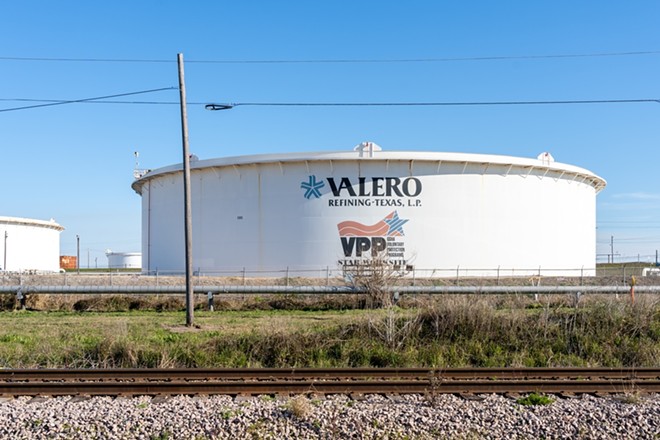Report: Top San Antonio companies haven’t made verifiable commitments on climate

Shutterstock / JHVEPhoto
Valero Energy is among the San Antonio-based corporations that highlight their action on climate change in public reports but haven’t agreed to independent verification by SBTi or Climate Group.
None of San Antonio’s biggest corporations has committed to cutting greenhouse gas emissions under the best-recognized global programs that track companies’ progress toward reaching net-zero targets, according to a new study.
An analysis by corporate-responsibility watchdog group Spendwell found that none of the 10 largest San Antonio-area companies is enrolled in the United Nations-backed Science-Based Targets (SBTi) initiative or Climate Group’s EP100 energy efficiency programs. The companies in the report were selected based on their annual revenues.
What’s more, only one of those companies, Rackspace Technology, has committed to a target with Climate Group’s RE100 program for transitioning to 100% renewable energy sources. The cloud-computing firm expects to hit that goal in 2026.
Spendwell officials said the SBTi and Climate Group programs are the gold standard for measuring businesses’ commitment to tackling climate change because they require companies to submit to independent verification rather than make vaguely worded statements about their efforts to reduce emissions.
“I think the most important thing about these two entities is that they’re both independently verifiable,” said Lincoln Bauer, Spendwell’s founder. “That’s what doesn’t exist in all these claims corporations use in talking about the great things they’re doing for the environment: independent verification.”
None of the San Antonio corporations on Spendwell’s list responded to the Current’s request for comment on the study. In addition to Rackspace, those include Valero Energy, USAA, H-E-B, Rush Enterprises, iHeartMedia, Zachry Group, Clear Channel Outdoor, Nustar Energy and Alamo Group.
SBTi and Climate Group provide what the Guardian newspaper recently called “science-based pathways” for companies to cut emissions. Experts and climate advocates said their validation processes are key ways businesses can demonstrate a serious commitment to tackling climate change.
Heavyweights such as 3M, Apple Inc. and Toyota Motor Corp. have made commitments under SBTi. Meanwhile, Google, General Motors and Johnson & Johnson and others have agreed to go 100% renewable under RE100, and Deloitte, Goldman Sachs, Hilton and others have enrolled in EP100.
Commitments versus statements
Like many large corporations, the 10 San Antonio-area companies on Spendwell’s list have released public statements trumpeting their environmental stewardship and efforts to combat climate change.
For example, USAA maintains an “Environmental Responsibility” webpage that details its recycling efforts, water-saving programs and energy usage. Its massive San Antonio headquarters building is the “largest financial office building in America to earn the ENERGY STAR certification award from the U.S. Environmental Protection Agency,” according to the site.
H-E-B has an online statement labeled “Environmental Sustainability” that includes details on its efforts to reduce water consumption and fossil fuel use while improving energy efficiency at its stores. The grocer notes that it’s the only Texas-based company invited to be a charter partner in the EPA’s SmartWay Transport Partnership, an initiative formed to cut greenhouse gas emissions.
For its part, Valero Energy issues an annual sustainability report that includes detailed environmental metrics. The oil and gas company is on target to achieve its goal of achieving 100% of its target of reducing or displacing 100% of scope 1 and 2 greenhouse gases by 2025, according to its 2023 report. Scope 1 emissions are those directly released from a company’s assets, whilescope 2 emissions result from sources it doesn’t directly own and control.
While SBTi and Climate Group are respected yardsticks for companies’ efforts to reduce emissions, Krystel Castillo, director of the Texas Sustainable Energy Research Institute at the University of Texas at San Antonio, said companies can show their environmental stewardship in other ways.
“As [corporate social responsibility] and the impact of corporations on the climate derive from a wide variety of actions and activities, it is important to keep a holistic perspective when evaluating the social performance of a…
Read More: Report: Top San Antonio companies haven’t made verifiable commitments on climate

